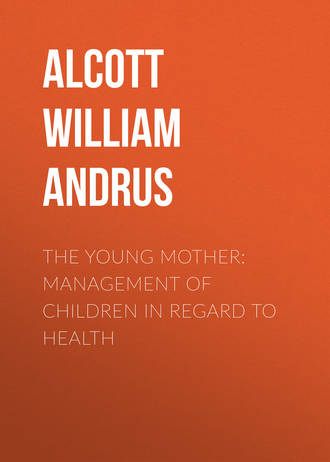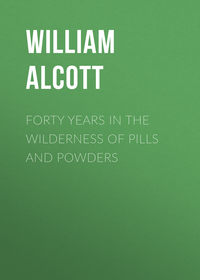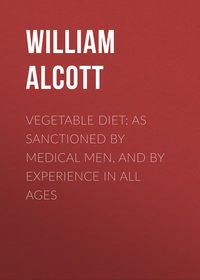 полная версия
полная версияThe Young Mother: Management of Children in Regard to Health
Nor is it enough to hang up a diaper by the fire, and, as soon as it is dry, apply it again. It should be clean, as well as dry. Let us not be told, that it is troublesome to wash so often. Everything is in a certain sense troublesome. Everything in this world, which is worth having, is the result of toil. Nothing but absolute poverty affords the shadow of an excuse for neglecting anything which will promote the health, or even the comfort of the tender infant.
Of the impropriety and danger of suffering wet clothes to dry upon us, I shall speak elsewhere; as well as of the evil of suffering children to remain dirty,—their skins or their clothing.
SEC. 10. Remarks on the Dress of BoysWhatever tends to disturb the growth of the body, or hinder the free exercise of the limbs, during the infancy and childhood of both sexes is injurious. And as every mother has the control of these things, I have thought it desirable to append to this chapter a few thoughts on the particular dress of each sex. I begin with that of boys.
"Nothing can be more injurious to health," says a foreign writer, "than the tight jacket, buttoned up to the throat, the well-fitted boots, and the stiff stock." And his remarks are nearly as applicable to this country as to England. The consequences of this preposterous method of dressing boys, are diminutive manhood, deformity of person, and a constitution either already imbued with disease, or highly susceptible of its impression.
No part of the modern dress of boys is more absurd, than the stiff stock, or thick cravat. It is not only injurious by pressing on the jugular veins, and preventing the blood from freely passing out of the head, but, by constantly pressing on the numerous and complex muscles of the neck, at this period of life, it prevents their development; because whatever hinders the action of the muscular parts, hinders their growth, and makes them even appear as if wasted.
It would be a great improvement, if this part of dress were wholly discarded; and when is there so appropriate a time for setting it aside, as before we began to use it; or rather while we are under the more immediate care of our mothers?
The use of jackets buttoned up to the throat, except in cold weather, is objectionable; but this is very fortunately going out of fashion.
Boots, if used at all, should fit well; to this there can be no possible objection. What the writer, whom I have quoted, referred to, was probably the tight boot, worn to prevent the foot from being large and unseemly; but producing, as tight boots inevitably do, an injurious effect upon the muscles, a constrained walk, and corns.
What can be more painful, than to see little boys—yes, little boys—boys neither fifteen, nor twenty, nor twenty-five, walk as if they were fettered and trussed up for the spit; unable to look down, or turn their heads, on account of a thick stock, or two or three cravats piled on the top of each other—and only capable of using their arms to dangle a cane, or carry an umbrella, as they hobble along, perhaps on a hot sun-shiny day in July or August?
But this evil, you who are mothers, have it very generally in your power to prevent, if you are only wise enough to secure that ascendancy over your children's minds which the Author of their nature designed. At the least, you can prevent it for a time—the most important period, too—by your own authority. This you will not need any urging to induce you to do, if you ever become thoroughly convinced of its pre-eminent folly.
SEC. 11. On the Dress of GirlsThe same general principles which should guide the young mother in regard to the dress of boys, are equally important and applicable in the management of girls. The whole dress should, as much as possible, hang loosely from the shoulders, without pressing on the body, or any part of it. This, I say, is the grand point to be aimed at; and this is the only great principle, whatever some mothers may think, which will lead to true beauty of person, and gracefulness of gesture.
There is, however, a slight difference to be made between the dress of girls and that of boys. The greater delicacy of the female frame requires that the surface of the body should be kept rather warmer, as well as better protected from the vicissitudes of the atmosphere.
But is this the fact? Is not the contrary true? While boys in the winter are clad in warm woollen vestments, covering every part of their trunk, many portions of the female frame, and especially many parts of their limbs, are left so much exposed, that in cold weather you scarcely find a girl abroad, who appears to be comfortable.
Nay, they are not only uncomfortable abroad, but at home; and if I were to present to mothers in detail, a tenth of the evils which their daughters suffer from not adopting a warmer method of clothing, I should probably be stared at by some, and laughed at by others. All this, too, without speaking of going out of warm concert rooms, theatres, ball rooms and lecture rooms, into the night air, or out of school rooms and churches, to walk home with measured and stiffened pace, lest the sin unpardonable of walking swiftly or RUNNING,—that active exercise which health requires, which youthful feeling prompts, and which duty ought to inspire,—should unwarily be committed.
The tremendous evils of confining the lungs have been adverted to at sufficient length. In reference to that general subject, I need only add, that if the chest be not duly exercised and expanded, the liver, the lungs, the stomach, digestion, absorption, circulation and perspiration, are all hindered. And even so far as the various internal organs of the body are active, they act at a great disadvantage. The blood which they "work up," is bad blood, and must be so, as long as the lungs do not have free play. Hence may and do arise all sorts of diseases; especially diseases of OBSTRUCTION; and such as are often very difficult of removal.
What can be a more pitiable sight than some modern girls going home from school or church in winter? Thinly clad, the blood is all driven from the surface upon the internal organs, and what remains is so loaded with carbon, which the lungs ought but cannot discharge, that her skin has a leaden hue; her teeth chatter; her very heart is chilled in her panting, frozen bosom; she cannot run, and if she could, she must not, for it would be vulgar! Every mother should shrink from the sight of such a picture.
CHAPTER V.
CLEANLINESS
Physiology of the human skin. Of checking perspiration. Diseases thus produced. "Dirt" not "healthy." How the mistake originated. "Smell of the earth." Effect of uncleanliness on the morals. Filthiness produces bowel complaints. Changing dress for the sake of cleanliness.
No mother will ever pay that attention to cleanliness which its importance to health and happiness demands, till she perceives its necessity. And she will never perceive that necessity till she has studied attentively the machinery of the human frame—and especially its wonderful covering.
The skin is pierced with little openings or pores, so numerous that some have reckoned them at a million to every square inch. At all events, they are so small that the naked eye can neither distinguish nor count them; and so numerous, that we cannot pierce the skin with the finest needle without hitting one or more of them.
When we are in perfect health, and the skin clean, a gentle moisture or mist continually oozes through these pores. This process is called perspiration; and the moisture which thus escapes, the matter of perspiration.
Perspiration may be checked in two ways. 1. by filth on the skin; 2. by what is commonly called taking cold—for taking cold essentially consists in chilling the skin to such a degree as to stop, for some time, the escape of this moisture. Most persons have doubtless observed, that in the first stages of a cold, they frequently have a very dry skin. Whereas, when we are in health, the skin usually feels moist.
Our health is not only endangered, and a foundation laid for fevers, rheumatisms, and consumptions, by stopping the pores of the skin with dirt, or anything else, but there is also danger from another and a very different source.
The blood, in its circulation through the body, is constantly becoming impure; and as it thus comes back impure to the heart, is as constantly sent to the lungs, where it comes in close contact with the air which we breathe, and is purified. But this same purifying process which goes on in the lungs, goes on, too, if the skin is in a pure, free, healthy condition, all over the surface of the body. If it is not—if the skin cannot do this part of the work—an additional burden is thus laid on the lungs, which in this way soon become so overworked, that they cannot perform their own proportion of the labor. And whenever this happens, the health must soon suffer.
The strange belief, that "dirt is healthy," has much influence on the daily practice of thousands of those who are ignorant of the human structure, and the laws which govern and regulate the animal economy. It has probably originated in the well-known fact, that those children who are allowed to play in the dirt, are often as healthy—and even more healthy—than those who are confined to the nursery or the parlor.
Now, while it is admitted that this is a very common case, it is yet believed that the former class of children would be still more vigorous than they now are, if they were kept more cleanly, or were at least frequently washed. It is not the dirt which promotes their health, but their active exercise in the open air; the advantages of which are more than sufficient to compensate for the injury which they sustain from the dirt. That is to say, they retain, in spite of the dirt, better health than those who are denied the blessings of pure air and abundant exercise, and subjected to the opposite extreme of almost constant confinement.
There is something deceitful, after all, in the ruddy, blooming appearance of those children who are left by the busy parent to play in the road or field, without attention to cleanliness. If this were not so, how comes it to pass that they suffer much more, not only from chronic, but from acute diseases, than children whose parents are in better circumstances?
I am the more solicitous to combat a belief in the salutary tendency of an unclean skin, because I know it prevails to some extent; and because I know also, both from reason and from fact, that it is a gross error.
It is, however, true, that years sometimes intervene, before the evil consequences of dirtiness appear. The office of the vessels of the skin being interrupted, an increase of action is imposed on other parts, especially on those internal organs commonly called glands, which action is apt to settle into obstinate disease. Hence, at least when aided by other causes, often arise, in later life, after the source of the evil is forgotten, if it were ever suspected, rheumatism, scrofula, jaundice, and even consumption.
There is a strange notion abroad, that the smell of the earth is beneficial, especially to consumptive persons. I honestly believe, however, that it is more likely to create consumption than to cure it. Besides, in what does this smell consist? Do the silex, the alumine, and the other earths, with their compounds, emit any odor? Rarely, I believe, unless when mixed with vegetable matter. But no gases necessary to health are evolved during the decomposition of vegetable matter; on the contrary, it is well known that many of them tend to induce disease.
I am thoroughly persuaded that too much attention cannot be paid to cleanliness; and the demand for such attention is equally imperious in the case of those who cultivate the earth, or labor in it, or on stone, during the intervals of their useful avocations, as in the case of those individuals who follow other employments.
I must also protest against the doctrine, that the smell or taste of the earth, much less a coat of it spread over the surface, and closing up, for hours and days together, thousands and millions of those little pores with which the Author of this "wondrous frame" has pierced the skin, can have a salutary tendency.
The opinion has been even maintained, that uncleanly habits are not only unfavorable to health, but to morality. There can be no doubt that he who neglects his person and dress will be found lower in the scale of morals, other things being equal, than he who pays a due regard to cleanliness.
Some have supposed that a disposition to neglect personal cleanliness was indicative of genius. But this opinion is grossly erroneous, and has well nigh ruined many a young man.
I am far from recommending any degree of fastidiousness on this subject. Truth and correct practice usually lie between extremes. But I do and must insist, that the connection between cleanliness of body and purity of moral character, is much more close and direct than has usually been supposed.
But to return to the more immediate effects of cleanliness on health. There is one class of diseases in particular which, in an eminent degree, owe their origin to a neglect of cleanliness. I refer to the bowel complaints so common among children during summer and autumn. Except in case of teething, the use of unripe fruits, or the abuse of those which are in themselves excellent, it is probable that more than half of the bowel complaints of the young are either produced or greatly aggravated by a foul skin.
The importance of washing the whole body in water will be insisted on in the chapter on Bathing; it is therefore unnecessary to say anything farther on that subject in this place, except to observe that whether the washings of the body be partial or general, they should be thorough, so far as they are carried. There are thousands of children who, in pretending to wash their hands and face, will do little more than wet the inside of their hands, and the tips of their noses and ears unless great care is taken.
Few things are more important than suitable changes of dress. There are those, who, from principle, never wear the same under-garment but one day without washing, either in summer or winter; and there are others who, though they may wear an article without washing two or three successive days, take care to change their dress at night—never sleeping in a garment which they have worn during the day.
It is a very common objection to suggestions like these, that they will do very well for those who have wealth, but not for the poor;—that they have neither the time nor the means of attending to them. How can they change their clothes every day? we are asked. And how can they afford to have a separate dress for the night?
There must be retrenchment in some other matters, it is admitted. In order to find time for more washing, or money to pay others for the labor, the poor must deny themselves a few things which they now suppose, if they have ever thought at all on the subject, are conducive to their happiness—but which are in reality either useless or injurious. Something may be saved by a reasonable dress, as I have already shown. Other items of expense, which might be spared with great advantage to health and happiness, and applied to the purpose in question, will be mentioned in the chapter on Food and Drink.
CHAPTER VI.
ON BATHING
Danger of savage practices. Rousseau. Cold water at birth. First washing of the child. Rules. Temperature. Bathing vessels. Unreasonable fears. Whims. Views of Dr. Dewees. Hardening. Rules for the cold bath. Securing a glow. Coming out of the bath. Local baths. Shower bath. Vapor bath. Sponging. Neglect of bathing. The Romans. Treatment of children compared with that of domestic animals.
Some of the hardy nations of antiquity, as well as a few savage tribes of modern times, have been accustomed to plunge their new-born infants into cold water. This is done for the two-fold purpose of washing and hardening them.
To all who reason but for a moment on this subject, the danger of such a practice must be obvious. So sudden a change from a temperature of nearly 100° of Fahrenheit to one quite low, perhaps scarcely 40°, must and does have a powerful effect on the nervous system even of an adult; but how much more on that of a tender infant? We may form some idea of this, by the suddenness and violence of its cries, by the sudden contractions and relaxations of its limbs and body, and by its palpitating heart and difficult breathing.
Every one's experience may also remind him, that what produces at best a momentary pain to himself, cannot otherwise than be painful to the infant. In making a comparison between adults and infants, however, in this respect, we should remember that the lungs of the infant do not get into full and vigorous action until some time after birth; and that, on this account, the hold they have on life is so feeble, that any powerful shock, and especially that given by the cold bath, is ten times more dangerous to them than to adults, or even to infants themselves, after a few months have elapsed.
It is surprising to me that so sensible a writer as Rousseau generally is on education, should have encouraged this dangerous practice; and still more so that many fathers even now, blinded by theory, should persist in it, notwithstanding the pleadings of the mother or the nurse, and the plainest dictates of common sense and common prudence.3
A child plunged into cold water at birth, by those whose theories carry them so far as to do it even in the coldest weather, has sometimes been twenty-four hours in recovering, notwithstanding the most active and judicious efforts to restore it. In other instances the results have been still more distressing. Dr. Dewees is persuaded that he has "known death itself to follow the use of cold water," in this way—I believe he means immediate death—and adds, with great confidence, that he has "repeatedly seen it require the lapse of several hours before reaction could establish itself; during which time the pale and sunken cheeks and livid lips declared the almost exhausted state" of the infant's excitability.4
We need not hesitate to put very great confidence in the opinion here expressed; for besides being a close and just observer of human nature, Dr. D. has had the direction and management, in a greater or less degree, of several thousands of new-born infants.
Nothing, indeed, in the whole range of physical education, seems better proved, than that while some few infants, whose constitutions are naturally very strong, are invigorated by the practice in question, others, in the proportion of hundreds for one, who are less robust, are injured for life; some of them seriously.
Nor will spirits added to the water make any material difference. I am aware that there is a very general notion abroad, that the injurious effects of cold water, in its application both internally and externally, are greatly diminished by the addition of a little spirit; but it is not so. Does the addition of such a small quantity of spirit as is generally used in these cases, materially alter the temperature? Is it not the application of a cold liquid to a heated surface, still? Can we make anything else of it, either more or less?
I do not undertake to say, that the cold bath may not be so managed in the progress of infancy, as to make it beneficial, especially to strong constitutions. It is its indiscriminate application to all new-born children, without regard to strength of constitution, or any other circumstances, that I most strenuously oppose. Of its occasional use, under the eye of a physician, and by parents who will discriminate, I shall say more presently.
Our first duty on receiving a new inhabitant of the world is, to see that it is gently but thoroughly washed, in moderately warm soft water, with fine soap. Special attention should be paid to the folds of the joints, the neck, the arm pits, &c. For rubbing the body, in order to disengage anything which might obstruct the pores, or irritate or fret the skin, nothing can be preferable to a piece of soft sponge or flannel. Though the operation should be thorough, and also as rapid as the nature of circumstances will permit, all harshness should be avoided. When finished, the child should be wiped perfectly dry with soft flannel.
While the washing is performed, the temperature of the room should be but a few degrees lower than that of the water; and the child should not be exposed to currents of cold air. If the weather is severe, or if currents of air in the room cannot otherwise be avoided, the dressing, undressing, washing, &c., may be done near the fire. And I repeat the rule, it should always be done with as much rapidity as is compatible with safety.
Here will be seen one great advantage of simplicity in the form of dress. If the more rational suggestions of our chapter on that subject are attended to, it will greatly facilitate the process of washing, and the subsequent daily process of bathing, which I am about to recommend to my readers.
This washing process is also an introduction to bathing. For it should be repeated every day; but with less and less attention to the washing, and more and more reference to the bathing. How long the child should stay in the bath, must be left to experience. If he is quiet, fifteen minutes can never be too long; and I should not object to twenty. If otherwise, and you are obliged to remove him in five minutes, or even in three, still the bathing will be of too much service to be dispensed with.
Nothing should be mixed with the water, if the infant is healthy, except a little soap, as already mentioned. Some are fond of using salt; but it is by no means necessary, and may do harm.
The proper hour for bathing is the early part of the day, or about the middle of the forenoon. This season is selected, because the process, manage it as carefully as we may, is at first a little exhausting. As the child grows older, however, and not only becomes stronger, but appears to be actually refreshed and invigorated by the bath, it will be advisable to defer it to a later and later hour. By the time the babe is three months old, particularly in the warm season, the hour of bathing may be at sunset.
The degree of heat must be determined, in part, by observing its effect on the child; and in part by a thermometer. For this, and for other purposes, a thermometer, as I have already more than hinted, is indispensable in every nursery. Our own sensations are often at best a very unsafe guide. There is one rule which should always be observed—never to have the temperature of the bath below that of the air of the room. If the thermometer show the latter to be 70°, the bath should be something like 80° perhaps with feeble children, rather more.
Great care ought always to be taken to proportion the air of the room and the water of the bath to each other. If, for example, the temperature of the room have been, for some time, unusually warm, that of the water must not be so low as if it had been otherwise. On the contrary, if the room have been, for a considerable time, rather cool, the bath may be made several degrees cooler than in other circumstances. But in no case and in no circumstances must a warm bath—intended as such, simply—be so warm or so cold, as to make the child uncomfortable; whether the temperature be 70°, 80°, or 90°.
It is hardly necessary to add, that in bathing a young child, the vessel used for the purpose should be large enough to give free scope to all the motions of its extremities. Most children are delighted to play and scramble about in the water. I know, indeed, that the contrary sometimes happens; but when it does, it is usually—I do not say always—because the countenances of those who are around express fear or apprehension; for it is surprising how early these little beings learn to decipher our feelings by our very countenances.
Some of our readers may be surprised at the intimation that there are mothers and nurses who have fears or apprehensions in regard to the effects of the warm bath; but others—and it is for such that I write this paragraph—will fully understand me. I have been often surprised at the fact, but it is undoubted, that there is a strong prejudice against warm bathing, in many parts of the country. In endeavoring to trace the cause, I have usually found that it arose from having seen or heard of some child who died soon after its application. I have had many a parent remonstrate with me on the danger of the warm bath; and this, too, in circumstances when it appeared to me, that the child's existence depended, under God, on that very measure. Perhaps it is useless in such cases, however, to reason with parents on the subject. The medical practitioner must do his duty boldly and fearlessly, and risk the consequences.





